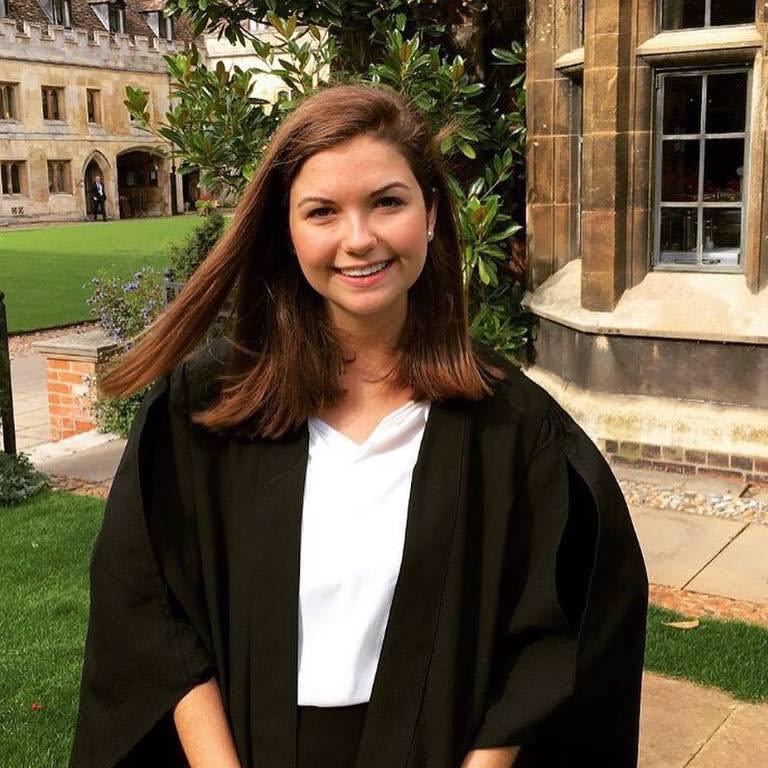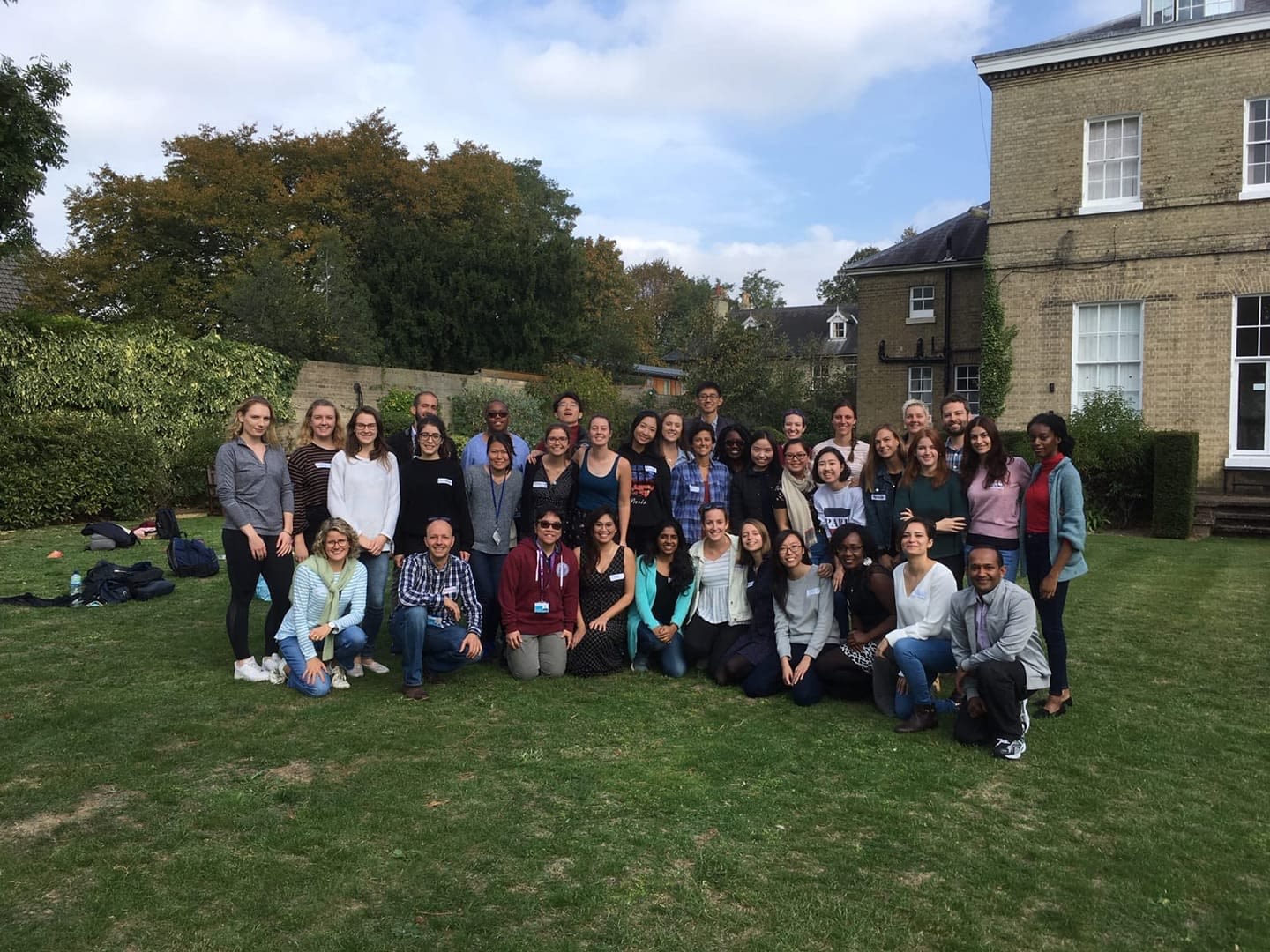

Profile:
Catherine Ward
Former MPhil student pursuing a career in law, social justice, and research

Catherine Ward, who studied for an MPhil in Education, Globalisation and International Development (EGID) at the Faculty in 2018/19 has recently had an academic paper published, based on work that she undertook during her course of study. Catherine is now studying at the University of Virginia Law School. She told us a little more about the research, her reasons for studying at Cambridge, and how an MPhil helped her to prepare for a career at the intersections of law, social justice and research.
I’m really interested in how we can better support asylum seekers and refugees
I’m from North Carolina in the US, and studied at Duke University for my undergraduate degree. I majored in English literature, but minored in Education and was particularly interested in migration narratives. During my time at Duke, I spent time working with refugees – mostly adolescents – and became interested in how we can better support their education, its role in helping them to adjust to life in the US, and in what it means to become an American citizen. I also spent a summer in Ireland working with children who were seeking asylum.
I chose to study at Cambridge because it offered me the chance to develop an academic perspective on issues that I want to address as a lawyer
I knew that I wanted to study law eventually, hopefully with a view to undertaking work that supports these disadvantaged young people. An understanding of education, philosophy and the relationship between culture and the law will be a huge part of that. I didn’t want my grasp of those issues to be based purely on what I’d learned in a classroom: I wanted to gain more research experience that involved working with young people themselves. The EGID course really stood out as a way to achieve that, because of the work that the academic staff have done with migrant young people and internationally. I had a phone call with Ricardo Sabates, who co-ordinates the course, and was just blown away by how positive and welcoming everyone seemed.

Catherine with her MPhil cohort
Catherine with her MPhil cohort
This research paper was based on an essay about equity that I wrote in my first term
The exercise involved choosing a word from a list of options and then writing an essay that explored its philosophical underpinnings. I chose ‘equity’. I was particularly interested in what that term might mean for the young people I had been working with in the United States. The work became the basis of this current academic paper, but it also informed a lot of what I did later on the MPhil. For my dissertation, I focused on understanding and facilitating a sense of belonging for unaccompanied asylum-seeking children in East England and I spent time with teachers and other professionals exploring how ideas about equity could be put into practice to support these young people, particularly through educational spaces.
Understanding equity, and how to operationalise it, is essential to providing young refugees and asylum-seekers with appropriate support
My paper looks at how different scholars – notably John Rawls, Michael Sandel and Amartya Sen – have interrogated what equity means and the difference between equity and equality. While equality is about being equal in terms of quantity, rank, status, value or degree; equity is more how we enable that – not least through education. If a social contract is supposed to ensure equality of opportunity for everyone, that presumes we create an equitable system that offers certain minimum standards and resources. But that is a particularly complex matter when we are dealing with young people who are seeking asylum in the US: they will not necessarily have the same access to education, or the same experience of it, as their peers.
We can’t simply give refugee and asylum-seeking students the same resources; they have to be actively welcomed into academic spaces and made to feel as if they belong.
These ideas gave me a basis for understanding what effective educational support for these young people might look like
Fundamentally, I think that equitable education ensures not just the provision of universal minimum standards, but their delivery to all students in an inclusive manner. We can’t simply give refugee and asylum-seeking students the same resources; they have to be actively welcomed into academic spaces and made to feel as if they belong. During my research at Cambridge, for example, I met many young women who would not have been able to pursue an education if they had stayed in their home country. So, while the availability of education to an asylum-seeking girl in Britain or the US is a minimum universal standard – that’s not necessarily enough: she might also need to be helped to understand that she deserves education in the same way that a male child does. Equitable education means working with students in a way that both honours their cultural background, and helps them to use education to fulfil their potential in the new contexts in which they find themselves.
My paper also looks at how these ideas can be applied in the US
I explored cases where this has been done well, and some gaps. For example, in the US, teachers are not typically required to develop cultural competencies to understand children’s diverse backgrounds. This leads to misjudgements, albeit often well-intended ones, such as putting migrant children on to vocational educational tracks, even though that might not be the path for which they are best suited. On the other hand, there are some great examples of schools where students are offered a sense of belonging and a welcoming environment free from discrimination. I reviewed programmes that were increasing intercultural dialogue in classrooms, for example, which give young people a sense that they are in control of their education and making a meaningful contribution at school.
We need more research to create a proper framework for educational equity in the US
Clearly there are some schools that are in a better position than others to support diverse populations. Fixing that requires a layered approach: we need to be able to look at clusters of schools and work out how best they can fulfil their obligations to these young people. That assumes a framework for improving and developing education that will require more research that explores the work of schools who are demonstrating good practice and the results of their efforts.
I want to work at the intersection of research, education, and law
Although I’m embarking on a legal career, I’m still involved with Education
I’m aiming to volunteer my time to pair my legal education with more research in this area. Going forward, I want to be at the intersection of research, education and legal work. While pursuing a career as a lawyer, I’ll be aiming to use what I’ve learned to do pro bono work to support refugee and asylum-seeker young people who have moved to the United States.
I can’t stress enough how much I loved my time at the Faculty
The cohort was phenomenal and incredibly diverse; I learned so much from them both formally and informally, and my peers are still people I talk to every week – sometimes every day. My supervisors, Hilary Cremin and Nidhi Singal, were exceptional. From Hilary I learned so much about peace studies and received incredible mentorship and supervision. I wrote my dissertation under Nidhi’s supervision, as she specialises in issues of educational inequity, and took away a huge amount from the guidance that she gave me. Both women helped me to think in a more nuanced way and to express my ideas in writing with far more confidence than I would have otherwise been able. Finally, Ricardo Sabates, was so welcoming and kind to all the students and really cultivated the sense of community that means we are still in touch and sharing ideas now. I’m really thankful: for the academics who gave us their time, the research opportunities the course opened up, and the colleagues I made along the way.